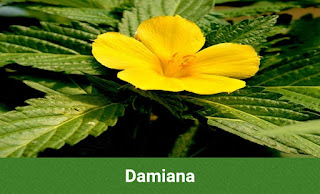Damiana
This plant of beautiful yellow flowers is known from pre-Columbian civilizations for its aphrodisiac effects. Currently, it can be prepared in different ways.
Damina is a plant from the Amazon area; It is known where it was discovered by ethnobotanists (specialists who study the relationship between plants and humans) who baptized it with this name. Also called Turro Aphrodisiac, grass of the Pastora or deer, Oreganillo or Pastorcilla. The plant grows today in warm areas, with humid climates such as northern South America and Central America including areas of the southern United States such as Texas.
Ancient cultures
Damiana leaves were originally used as natural medicine by the indigenous cultures of Central America, mainly in Mexico.
Damiana leaves were originally used as natural medicine by the indigenous cultures of Central America, mainly in Mexico.
Curiosity
Numerous books relate the exploits that colonization doctors have done with plants.
Numerous books relate the exploits that colonization doctors have done with plants.
Damiana has been awarded the ability to cure Nephritic Albuminuria (syndrome produced by scarlet fever and measles) and Cardiac Albuminuria (syndrome generated by congenital heart failure).
Properties It has stimulating and aphrodisiac effects.
Soft laxative
Tonic of the nervous system.
It acts on the spinal centers, stimulating urination, erection and ejaculation.
It acts on the spinal centers, stimulating urination, erection and ejaculation.
It is used in cases of male impotence and female frigidity, especially if it is due to a psychic cause.
Liqueur
In the past, the Guaycura Indians made a liquor from this plant that grew in the desert of Baja California, Mexico. They drank it in all their ceremonies for its aphrodisiac powers and for its magnificent digestive and relaxing effect.
In the past, the Guaycura Indians made a liquor from this plant that grew in the desert of Baja California, Mexico. They drank it in all their ceremonies for its aphrodisiac powers and for its magnificent digestive and relaxing effect.



0 Comments